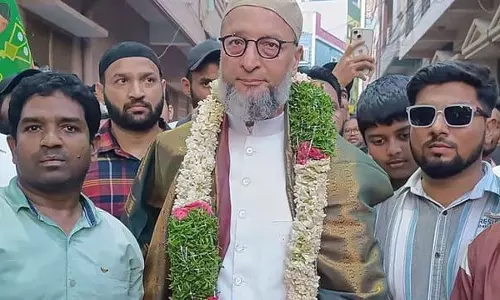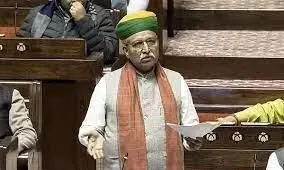
Rajya Sabha passes bill redefining appointment procedures for election commissioners
text_fieldsNew Delhi: In the Winter Session, the Rajya Sabha passed the Chief Election Commissioner and Other Election Commissioners (Appointment, Conditions of Service and Term of Office) Bill, 2023 on Tuesday.
This legislation holds the intent to streamline the appointment protocols, terms of service, and functional guidelines for the Chief Election Commissioner (CEC) and other Election Commissioners (EC), supplanting the erstwhile Election Commission (Conditions of Service of Election Commissioners and Transaction of Business) Act of 1991, reported Live Law.
The bill's prime objectives encompass the delineation of the selection, remuneration, and dismissal procedures concerning the CEC and ECs.
A key change from the existing provisions is regarding the constitution of the selection committee on whose recommendation the officials are appointed by the President. As per the bill, the committee is composed of the Prime Minister, a Union Cabinet Minister, and either the Leader of the Opposition or the head of the largest opposition party in the Lok Sabha.
Until now, the Chief Justice of India was a member of the panel, who will now be replaced by a Union Cabinet Minister nominated by the Prime Minister. In effect, the new clause gives the government nominees,i.e. the Prime Minister and the Cabinet minister a majority voting power of 2 in 3, whereas the Leader of the Opposition is only one of three.
The exclusion of the Chief Justice of India from the selection committee is a departure from the Supreme Court's directive earlier this year. The Supreme Court, through a constitution bench led by Justice KM Joseph, had mandated the inclusion of the Chief Justice in the committee, emphasising the necessity for a legislative framework to govern the selection process for election commissioners.
Additionally, a search committee, chaired by the Law Minister, is mandated to propose a panel of candidates to the selection committee, specifying eligibility criteria requiring candidates to have held a position equivalent to the central government's secretary.
Initially, the bill stipulated aligning the salary and service conditions of the CEC and ECs with that of a Cabinet Secretary, diverging from the prior benchmark set at a Supreme Court judge's remuneration. This sparked concerns raised by former CECs who viewed this alteration as a downgrade to the Election Commission's status.
Responding to these apprehensions, the government introduced an amendment ensuring the maintenance of the CEC and ECs' salary and perks at the level of a Supreme Court judge, retracting the proposed alignment with a Cabinet Secretary's compensation.
The amendment package extended further modifications to the search committee and the process of removing the CEC and ECs from their positions. Moreover, it incorporated a clause safeguarding these officials from legal ramifications for actions executed during their tenure, provided such actions were carried out in the discharge of their official duties.
In the midst of deliberations on the bill, Rajya Sabha Chairman Jagdeep Dhankhar emphasised the supremacy of parliament in legislation, asserting, "The parliament is the supreme body when it comes to law-making. We cannot suffer interventions of any other organ, be it executive or judiciary., an indirect reference to what the bench of Justice KM Joseph had recommended, which however was a temporary mechanism until the enactment of legislation for the purpose. That legislation has now materialised but minus the principle of fairness the bench had aimed at enshrining by making the selection panel a body without any predominant government representation.
This statement came as a response to Congress legislator RS Surjewala's reference to the recent Supreme Court judgement on the appointment of election commissioners.
The bill encountered opposition from members of opposing parties, leading to a walkout during its passage in the upper house. Their protest highlighted concerns over perceived executive overreach and the erosion of the election commission's independence.























